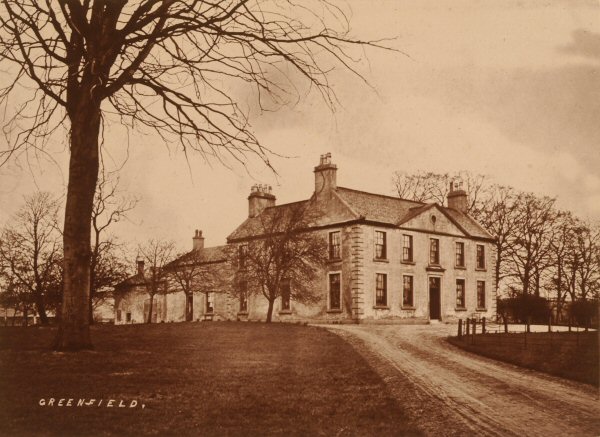

GREENFIELD HOUSE is in the parish of Shettleston, and distant from Glasgow three miles.
The lands and mansion-house of Greenfield were purchased by James M'Nair, great-grandfather of the present proprietor, in 1759, from Isabel Luke, daughter of Robert Luke, goldsmith in Glasgow, then wife of George Bogle, merchant in Glasgow.
The adjoining lands and mansion-house of Shettleston were purchased by the same James M'Nair from Robert Bogle, merchant in Glasgow, on 31st August, 1762.
There is an old thorn-tree near the house, under which Charles Edward is said to have breakfasted in 1745.
The father of the present proprietor, Colonel James M'Nair, K.H., was a distinguished Peninsular officer, serving throughout the campaign with the 52nd Regiment, one of those forming the famous Light Brigade; he received a severe wound in the head at the storming of Badajoz.
There is coal on the estate, which has been successfully worked for a long period.
[1878.]
Rogers, in a notice on Villenage in Scotland, has a curious story which the mention of the Greenfield coal recalls.
In the year 1820, the story goes, Mr. Robert Bold of Alloa was on a visit to his friend Mr. Colin Dunlop, then of Clyde. Mr. Dunlop called up one of the workers, an old man who went by the name of "Moss Nook," and bad him tell the gentleman how he came to Clyde. Moss Nook explained that he had "belonged" as a boy to MacNair of Greenfield, that Greenfield had taken a fancy to a pony of James Dunlop's (Colin's father), and "had niffered him for the beast," and that he had been sent over to Clyde then and there, and had been there ever since.
It is well known that our colliers and salters were in old times slaves, adscripti glebae. But it is not so well known how late the system lasted. It was intended to be abolished (three years after the famous Somerset case) by the Act of 1775, whose preamble bears that "many Colliers and Coalbearers and Salters are in a state of slavery or bondage, bound to the Collieries or Saltworks, where they work for life, transferable with the Collieries and Saltworks." But the collier-owners managed still to keep some grip of their men, and the last Briton did not quite cease to be a slave till the Act of 1799 (ten years after the French Revolution), which bears that "many Colliers and Coalbearers still continue in a state of bondage." As late as 1842, before the Scotch Mining Commission, a collier from Musselburgh, five miles from the Parliament House, gave evidence that he had wrought for years as a slave, and that he, his father, and his grandfather had been born slaves. And a little later still, some time after 1843, Dr. Norman Macleod had among his Dalkeith members a woman who had been born a slave.
Back to Contents